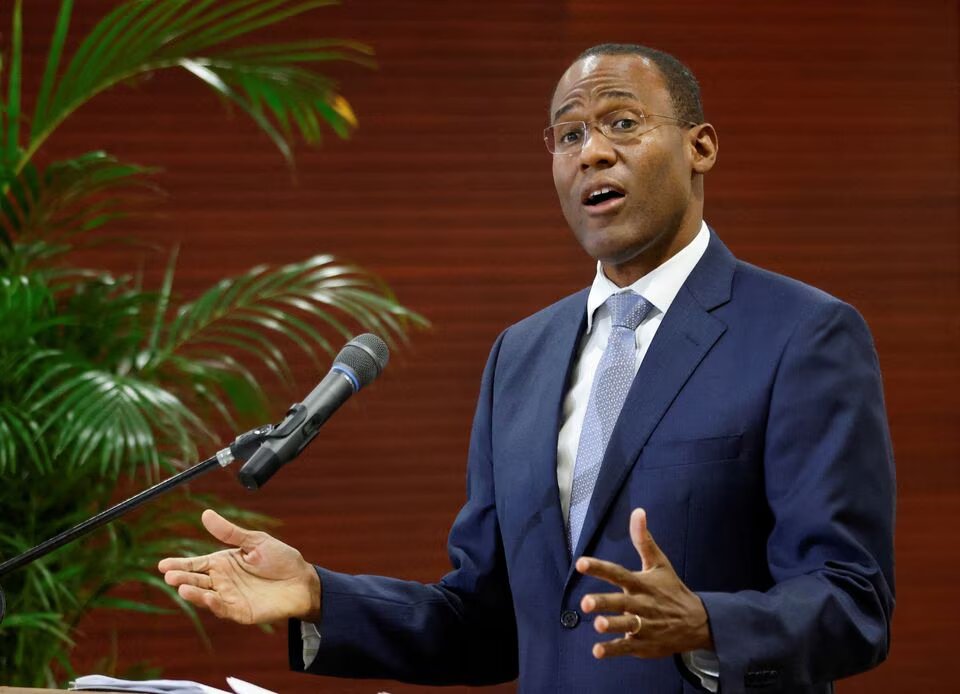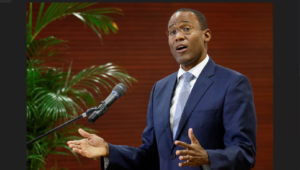KINGSTON (Reuters) — Jamaican Finance Minister Nigel Clarke said he is seeing “definite interest” from other Caribbean countries to join in issuing a regional catastrophe bond that would protect their budgets from hurricanes and spread investor risk across more countries.
Clarke told Reuters in an interview on Wednesday that he plans to reissue Jamaica’s current bond when it matures at the end of this year’s hurricane season in December. The bond provides up to $185 million in disaster insurance payouts to Jamaica if named storms and hurricanes meet certain thresholds.
He is trying to sell the regional bond idea to Barbados, the Bahamas and other countries that are seeing increased hurricane activity and intensity due to climate change.
“Jamaica will certainly reissue our bond, even if we don’t have anyone else to come with us,” Clarke said. “But interest has been indicated and we’ll take it from there,” he added, without naming specific countries or dollar amounts. Jamaica launched its current catastrophe bond in 2021. It was designed and facilitated by the World Bank, which holds the principal in trust to be paid out in the event of a disaster to pay for immediate repairs and assistance that would otherwise strain its budget.

Jamaica’s Minister of Finance and the Public Service Nigel Clarke addresses the audience during a news conference on the alleged fraudulent activities of Kingston-based Stocks and Securities Ltd (SSL), in Kingston, Jamaica January 23, 2023. REUTERS/Gilbert Bellamy/File Photo
“For us, it provides the financial protection that we need to make ourselves resilient to the effects of climate change and natural disasters,” Clarke said.
Combining forces with other countries would diversify investor risk and lower issuance costs, he added.
World Bank President Ajay Banga, in Jamaica on his first foreign trip since taking office on June 2 to promote his agenda to expand the bank’s anti-poverty role into climate finance, told Reuters that he supports the catastrophe bonds.
“These bonds allow you to plan in advance, Banga said. “Why do you wait for the catastrophe to happen and then do something? Why don’t we give you the peace of mind that this exists for you?”
ATTRACTING INVESTMENT
Clarke said he intends to work closely with Banga on this and other initiatives to make Jamaica a more resilient economy.
Clarke said he wants to use the World Bank’s expertise to help “crowd-in” over $1.5 billion in private investments over the medium term through public-private partnerships in transport, sanitation and information technology infrastructure using the country’s post-COVID fiscal stability and strong recovery to attract foreign investors.
He also said he aims to use the World Bank’s knowledge base to help redesign Jamaica’s education system to boost worker skill levels, deepen the social safety net and digitize government services to make their delivery more efficient.
The World Bank also can help Jamaica in boosting its growth potential by deepening its tourism industry and diversifying its economy as a destination for the “near-shoring” of North American supply chains that is under way, he said, adding that Jamaica aims to use its location to become a logistics hub.
SMALL BUSINESS SUPPORT
Chorvelle Johnson Cunningham, CEO of Sagicor Bank, Jamaica’s fourth-largest lender, said she wants to expand the bank’s work with the World Bank’s private sector arm, the International Finance Corp, to support small and medium-size enterprises (SMEs) under Banga. Sagicor has a $40 million loan from IFC to support small firms, including many small farmers, part of a program to train small proprietors.
“The SME sector will decide whether this country succeeds,” Johnson Cunningham said. “We need the support of IFC to support the SMEs.”
Reporting by David Lawder; Editing by Leslie Adler and David Gregorio
Our Standards: The Thomson Reuters Trust Principles.

